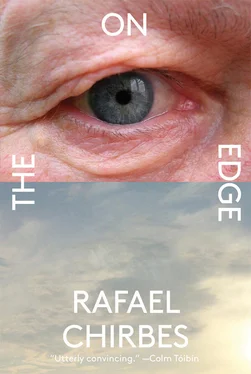In an essay (Chirbes has four books of essays) focusing on the work of one of his totem authors and a fellow member of the underclass, Juan Marsé, Chirbes writes: “He devoured his predecessors, ground them up into little pieces and built a new height over their remains from which to observe.” This is what Chirbes did in his last two books that are linked like bubbly ( cava ) and a hangover; Crematorio describes the Spanish soul at the beginning of the twenty-first century, particularly on the Mediterranean coast during the heyday of the real-estate bubble. But if Crematorio was about bling and bigger-than-thou yachts and beachfront properties, On the Edge takes a swan dive into the putrid bog left behind when the bubble burst. The main character is the marsh, the poisoned quagmire where the mafias dump their hot guns and cars, where toilet bowls float with construction site debris, where corpses were hacked and disposed of. It chronicles in human terms the consequences when the tower of cards came tumbling down and asks very difficult questions: Are the underclasses any better off now, than they were under Franco? Do we remember how much they struggled? “I dream about the dead people I knew when they were alive,” Chirbes said to me in Xalapa, México: “I’ve touched them, even, and now they’re nowhere, and knowing that they’re not here and that I can’t talk to them or hear their voices distresses me when I go to bed. Some nights they take control of the room: their absence leaves me breathless and I have to turn on the light so I don’t suffocate.” What has his generation done with the new democracy they were given? The word “carrion” appears in the last sentence of Crematorio and in the first one of On the Edge . “The wind has dropped again, and in the ensuing calm, from the place where the dog is scratching, a sickly smell of old carrion rises up, impregnating the air.” “The first one to spot the carrion is Ahmed Ouallahi.” The young Moroccan sees a dog chewing on something. Other dogs try to take it away. He draws closer, apprehensively. It’s a human hand.
On the Edge is a masterful example of writing at the top of its form, a centrifugal novel with sentences like sticky tentacles that clutch onto readers and suck them into a swirling, tempestuous, pulsating center. The tension comes from the language itself, from the myriad stories of his characters all told in his characteristic torrential, terse, powerful prose, whose cadences echo his beloved American writers, Faulkner, Mailer and Dos Passos. Language that is as theological as it is diabolical, that keeps a surreptitious network, or builds a web, like a dictatorship. On the Edge garnered a second National Critic’s Award and, finally, the National Prize for Literature.
Rafael Chirbes, who died in August 2015 after being diagnosed with incurable lung cancer, accepted his role as the defiant, intrepid author who bears witness, who acts as counterbalance to the forces of power, of corruption and of greed and misery, yet writes lucidly, and even at times tenderly. “Literature obliges a radical practice, it demands a form of aloneness that yes, at times can be almost unbearable: but it’s a matter of old virtues and harsh discipline.” Writing was his form of observing and expiating his own inconsistencies and primal urges — sex, power, money — in their modern iterations — real estate speculation, prostitution and human trafficking, political debauchery — and challenging readers to look into his pages as into a dark mirror, to see the ghostly reflection of their own faces looking back. What redeems these scathing truths — for a writer with this experience and depth of insight — is art.
Valerie Miles












